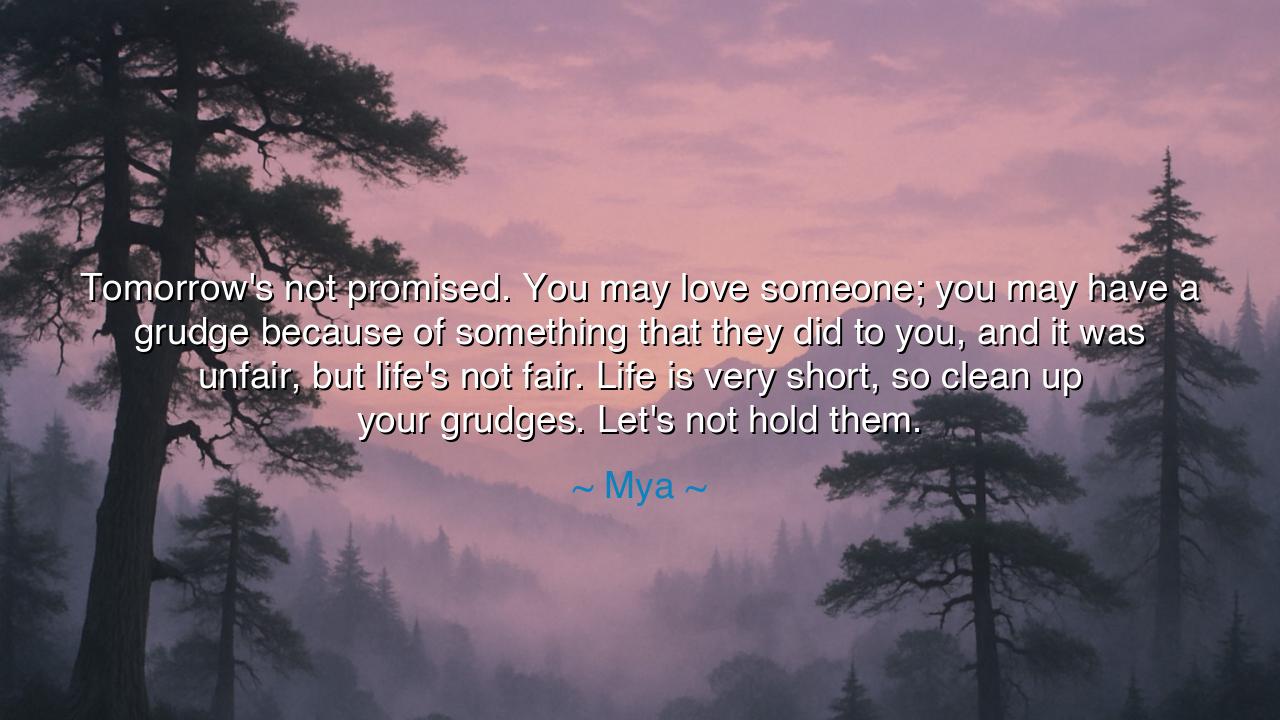
Tomorrow's not promised. You may love someone; you may have a
Tomorrow's not promised. You may love someone; you may have a grudge because of something that they did to you, and it was unfair, but life's not fair. Life is very short, so clean up your grudges. Let's not hold them.






In the quiet wisdom of her heart, the singer and humanitarian Mya once said: “Tomorrow’s not promised. You may love someone; you may have a grudge because of something that they did to you, and it was unfair, but life’s not fair. Life is very short, so clean up your grudges. Let’s not hold them.” These words, though born in the modern age, carry the ancient music of truth — the reminder that all we love, all we fear, all we cling to is bound by time. The horizon of tomorrow is never guaranteed. Thus, forgiveness is not merely a virtue; it is the wisdom of the soul that understands the fleeting nature of life.
Mya, whose life and art have been steeped in emotion and reflection, speaks from a place of hard-won clarity. She has witnessed the fragility of existence — how swiftly moments pass, how suddenly the people we love can be taken from us. In her words lies the essence of humility: the recognition that life is short and that clinging to bitterness is like holding fire in our own hands. Grudges do not punish others; they consume the one who bears them. To “clean up your grudges,” as she so simply puts it, is to cleanse the heart of poison, to free oneself for love and peace before time steals the chance away.
The origin of this wisdom reaches beyond one voice; it is as old as humanity itself. The sages of every culture have taught that forgiveness is the bridge between suffering and serenity. In ancient scriptures, it is said that to forgive is to be like water — soft, flowing, yet strong enough to wear down mountains. The Stoics, too, taught that resentment binds us to what we despise. Mya’s words echo this timeless law: to carry anger into tomorrow is to waste the gift of the present. She reminds us that life’s unfairness is not an excuse for hatred, but a call to compassion — for we are all imperfect, all wounded, all trying to find our way home through the same brief span of years.
History offers many who have embodied this truth. Consider Nelson Mandela, who emerged from twenty-seven years of unjust imprisonment not with vengeance, but with grace. He had every reason to hate, to hold his oppressors in eternal contempt, yet he chose instead to forgive. When asked why, he said, “Resentment is like drinking poison and then hoping it will kill your enemies.” In releasing his bitterness, he liberated not only himself, but an entire nation. His example is the living proof of Mya’s wisdom: that forgiveness is strength, not weakness; that to let go is the most powerful act a human being can perform.
Yet to “clean up your grudges” does not mean forgetting the wrongs done to you. It means releasing their hold on your heart. The ancients knew that the human soul cannot thrive when weighed down by anger. Just as a tree must shed its old leaves to make way for new growth, we too must release resentment to make space for peace. When we cling to grievances, we remain trapped in the past, unable to see the light of the present. Forgiveness does not excuse injustice; it restores our freedom to live fully despite it. To forgive is to claim mastery over one’s own spirit — to say, “I will not let pain define me.”
Mya’s call to forgiveness is not sentimental, but deeply practical. She reminds us that time is not an infinite gift. “Tomorrow’s not promised,” she warns — and in that truth lies urgency. Many have carried their grudges to the grave, never finding the courage to reconcile, never speaking the words “I forgive you,” or “I love you,” while they had the chance. Life’s brevity demands that we act now — to mend what is broken, to reach out before silence becomes permanent. For there will come a day when the chance to forgive will be gone, and only regret will remain.
So, my dear listener, take this teaching to heart: life is short, but the heart can be vast. Do not spend its precious days feeding the fires of anger. When you feel wronged, pause and breathe before bitterness takes root. Seek understanding, not vengeance. Offer forgiveness not because the other deserves it, but because you do — because your soul deserves peace. Speak kindly while you can. Rebuild bridges where they have crumbled. Remember that every sunrise is a gift, and every person you love could be gone before the next.
For in the end, as Mya reminds us, the measure of a life well-lived is not how tightly we hold our grudges, but how freely we give our love. To forgive is to honor life itself — to say yes to its brevity, yes to its beauty, yes to the fragile miracle of this moment. Let go, then, of what no longer serves you. Forgive quickly, love deeply, and walk lightly — for tomorrow, though uncertain, will always belong to those who choose peace.






AAdministratorAdministrator
Welcome, honored guests. Please leave a comment, we will respond soon